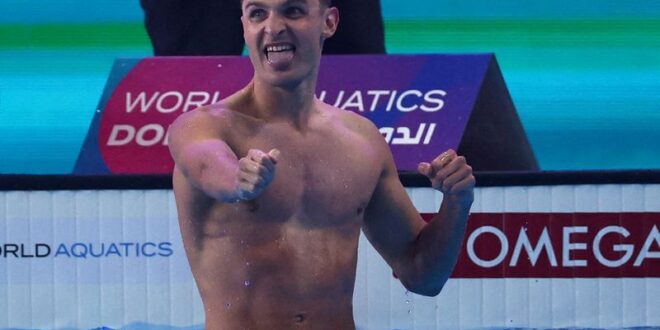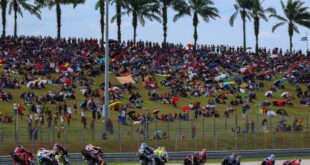(Reuters) – A big win deserves a big celebration, and New Zealand swimmer Lewis Clareburt delivered at the Doha World Championships in February with eyes ablaze and tongue poked out in a Maori “pukana” after claiming the 400m individual medley title.
Clareburt will hope to have another chance to break out the pukana in the Paris pool and perhaps become the first Maori swimmer to win an Olympic medal.
Pukana often come at the end of a haka, a ceremonial Maori dance invariably linked with the New Zealand rugby team who perform them before international matches.
“It was to scare opponents, back in the day, in war,” Clareburt told Reuters of the pukana.
“It’s to show the challenge, essentially like, ‘Bring it on!’
“I thought it was cool and I really wanted to put New Zealand’s Maori culture on the map … I feel like it’s kind of my Usain Bolt celebration now.”
‘WILD THINGS’
Maori culture is well represented in New Zealand’s Olympic swim team, with freestyle specialists Erika Fairweather and Taiko Torepe-Ormsby from the Ngai Tahu community.
About 900,000 people in New Zealand, or 17% of the population, identified as Maori last year, according to government estimates.
While Maori culture is a strong part of New Zealand’s identity, the nation’s centre-right government has pledged to wind back some of the indigenous policies of previous administrations, including those promoting the official use of the Maori language.
The moves have triggered lawsuits and protests, with critics calling them the most significant step back for Maori rights in decades.
Some Maori athletes have also been critical, including players from a women’s rugby team who generated headlines in March when they denounced the government during a haka before a match.
Clareburt’s pukana, which went viral on social media in New Zealand, was well received by most of his compatriots but also brought out some trolls.
“There was one side who were saying I shouldn’t do it and another who were saying it was awesome,” said the 24-year-old.
“I’m taking the awesome side.”
Clareburt’s strongest medal chance at the July 26-Aug. 11 Olympics is most likely in the gruelling 400m individual medley (IM) but he will also swim in the 200m IM and the 200m butterfly.
He won his 400m medley world title in Doha where French sensation and world record holder Leon Marchand elected not to swim.
Marchand, who won back-to-back world titles in the 200 and 400m IM in 2022-23, has been hailed as a generational talent ready to make his mark in front of home fans on the biggest stage.
Clareburt said if the Frenchman is on form then he and the rest of the 400 IM field will probably be swimming for the minor medals.
But the Olympics can do “wild things” to athletes.
“This guy has got the world of pressure on his back,” said Clareburt.
“I can only imagine how he’s feeling and how he’s trying to handle that, especially with a home Olympics.
“So I’m not going to say he’s a certainty for the gold medal. If he leaves any stone unturned, I know that the door is wide open.
“There will be people, including hopefully me, that will happily take it off his hands if he’s not on form.”
(Reporting by Ian Ransom in Melbourne; Editing by Peter Rutherford)
 BeritaKini.biz Berita Viral Terkini di Malaysia
BeritaKini.biz Berita Viral Terkini di Malaysia





